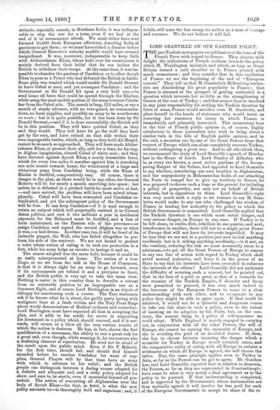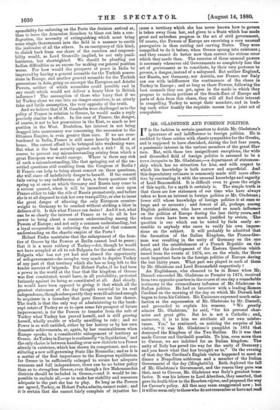LORD GRANVILLE ON OUR EASTERN POLICY.
THE pro-Turkish newspapers are jubilant over the tone of the French Press with regard to Greece. They observe with delight the indications of French coolness towards the policy which M. Waddington initiated, and which, so long as Great Britain turned a cold shoulder to it, France pressed with much earnestness ; and they consider that in this vacillation of France we see the beginning of the end of " European concert." They tell us that M. Gambetta's Hellenizing tenden- cies are diminishing his great popularity in France ; that France is alarmed at the prospect of getting embroiled in a question which interests her so little as the strengthening of Greece at the cost of Turkey ; and that sooner than be involved in any joint responsibility for settling the Turkish Question by force of arms, France would sacrifice even M. Gambetta, and place herself in the hands of statesmen who would insist on reserving her resources for issues in which France is immediately and primarily interested. This momentary turn in the tide of French public opinion is, of course, highly satisfactory to those journalists who wish to bring about a similar turn in the tide of English public opinion, and in the end, a secession one by one of the Great Powers from that concert of Europe which can alone completely overawe Turkey, without endangering a great war. And to all who think thus, we recommend the study of Lord Granville's speech of Monday last in the House of Lords. Lord Stanley of Alderley, who is, as every one knows, a most active partisan of the decom- posing Empire of the Sultan, had appealed to Lord Granville to say whether, considering our own troubles in Afghanistan, and the unpopularity in Mahommedan India of our attacking the Porte to compel her to give up territory to Greece, he was prepared to choose such a time as the present for initiating a policy of gunpowder, not only not on behalf of British interests, but in opposition to them. Lord Granville's reply was very much such a reply as we venture to say M. Gam- betta would make, to any one who challenged the wisdom of France in lending her authority to the policy to which the British Government is committed. Lord Granville replied that the Turkish Question is one which must entail danger, and very serious danger, on Europe in any case. If Turkey is to be left alone, to excite, first, rebellion in one quarter, and next, interference in another, there will not be a single great Power of Europe that will not have its interests imperilled. It may be true that we are not in a position just now to risk anything needlessly, but is it risking anything needlessly,—is it not, on the contrary, reducing the risk we must necessarily incur to a minimum,—to get all the Great Powers of Europe to concur in any one line of action with regard to Turkey which shall avoid mutual jealousies, and leave it in the power of no State to say that its interests have been overruled to subserve the interests of the others I Lord Granville did not underrate the difficulty of securing such a concert, but he pointed out, that in the face of a peril so great as that of a scramble for the remains of the Turkish Empire, if disorder and decay were permitted to proceed, it was very much indeed to the interests of the European Powers to come to a clear understanding with each other, and to co-operate in any policy they might be able to agree upon. If that could be achieved, it would not bo a Quixotic and dangerous course to take our fair share in such a policy, even to the extent of insisting on its adoption by the Porte, but, on the con- trary, the nearest thing to a policy of self-insurance we could adopt. While England is merely engaged in carrying out, in conjunction with all the other Powers, the will of Europe, she cannot be earning the animosity of Europe, and she is avoiding the peril of an insulated course. If, then, she has to choose between incurring the danger which a scramble for Turkey in Europe would certainly cause, and the comparative safety of acting with all Europe to enforce a settlement on which all Europe is agreed, she will choose the latter. Nay, the same principle applies even to Turkey in Asia, so far as the Powers can be got to agree. Mr. Goschen has, said Lord Granville, reported that in relation to Armenia, the Powers, so far as they are represented in Constantinople, have come to what is very nearly a final agreement as to the policy to be pursued. If that understanding is completed, and is approved by the Governments whose ambassadors are thus mutually agreed, it will involve far less peril for each of the European Governments to accept its share of the re
sponsibility for enforcing on the Porte the decision arrived at, than to leave the Armenian disorders to blaze out into a con- flagration, the necessity of extinguishing which must bring some single Government into the field in a manner to excite the jealousies of all the others. In an emergency of this kind, to shrink back from our share of the exertion and responsi- bility would, as Lord Granville implied, be not only pusil- lanimous, but shortsighted. We should be pleading our Indian difficulties as an excuse for making our general position worse. For how would the prospects of peace in India be improved by having a general scramble for the Turkish posses- sions in Europe, and another general scramble for the Turkish possessions in Asia, going on amongst the European and Asiatic Powers, neither of which scrambles could possibly end in any result which would not deliver a heavy blow to British influence V The assumption of those who fancy that if we let Turkey alone we run into no danger ourselves, is an utterly false and futile assumption, the very opposite of the truth.
And we believe that if M. Gambetta were challenged as to the policy of France in relation to Greece, he would make a reply precisely similar in effect. In the case of France, the danger, of course, is not to her possessions in the East, so much as her position in the West. Doubtless, her interest in not being dragged into unnecessary war concerning the succession to the Ottoman Empire, is even greater than ours. If we are over- burdened in India, France is still more heavily burdened at home. She cannot afford to be betrayed into weakening wars. But what is the best security against such a risk? It is, of course, to prevent any misunderstanding arising from which a great European war would emerge. Where is there any risk of such a misunderstanding, like that springing out of the un- settled questions still resulting from the Congress of Berlin ? If France can help to bring about concert on these questions, she will stave off indefinitely danger to herself. If the concert fails owing to any indifference of hers, a dozen questions will spring up at once on which Germany and Russia may come to a serious quarrel, when it will be incumbent at once upon France either to take the side of Russia prematurely, and before she is at all disposed to risk her own tranquillity, or else to incur the great danger of allowing the only European counter- weight to Germany to bo crushed without striking a blow in defence of it. Is this what France can desire ? And if not, what can be so clearly the interest of France as to do all in her power to bring about a common understanding among the Powers of Europe ; and not only a common understanding, but a loyal co-operation in enforcing the results of that common understanding on the chaotic empire of the Porte ?
Hobart Pasha maintains that the enlargement of the fron- tier of Greece by the Powers at Berlin cannot lead to peace ; that it is a mere robbery of Turkey—for, though he would not have scrupled at all to rob Bulgaria for the sake of Greece, Bulgaria who has not yet had and abused the opportunity of self-government—he scruples very much to deprive Turkey of any part of that territory which she has so long left to the tender mercies of 'srigands. But Hobart Pasha, if he had been a power in the world at the time that the kingdom of Greece was first constituted, would have, in all probability, protested furiously against its being so constituted at all. And clearly, he would have been opposed to giving it that which all the greatest statesmen of the day thought essential to its real independence, though subsequently they were ill-advised enough to acquiesce in a boundary that gave Greece no fair chance. The truth is that the only way of administering to the bank- rupt estate of Turkey so as to open some fair prospect of future improvement, is for the Powers to transfer from the rule of Turkey what Turkey has proved herself, and is still proving herself, wholly unable or wholly unwilling to rule ; and no Power is so well entitled, either by her history or by her own domestic achievements, or, again, by her reasonableness when Europe speaks, to a considerable enlargement of territory as Greece. As Turkey in Europe is confessedly "in liquidation," and the only choice is between handing over new districts to a Power already in existence, which has shown its competence, and con- stituting a new self-governing State like Roumelia; and as it is a matter of the first importance to the European equilibrium for Greece to be sufficiently enlarged to secure her adequate resources and full independence, there can be no better policy than so to strengthen Greece, even though a few Mahommedan districts should be included in Greece,—and it would be im- possible to exclude all,—as to make her stability and resources adequate to the part she has to play. So long as the Powers are agreed, Turkey, as Hobart Pasha admits, cannot resist; and it is certain that she cannot fairly complain of injustice be-
cause a territory which she has never known how to govern is taken away from her, and given to a State which has made great and unbroken progress in the art of civil government. Of course, the Powers of Europe are exercising a very unusual prerogative in thus cutting and carving States. They were compelled to do it before, when Greece sprang into existence ; and they cannot do better now than correct the serious error which they made then.. The exercise of these unusual powers is necessary whenever old Governments so completely lose the art of government as to constitute, by their very pretence to govern, a danger, instead of a safeguard. But neither England, nor Russia, nor Germany, nor Austria, nor France, nor Italy can see with indifference the continuance of the chaos in Turkey in Europe ; and so long as these Powers, following the- best counsels they can get, agree in the mode in which they propose to redeem portions of the South-East of Europe and parts of Asia from this chaos, they will all find their interest in compelling Turkey to accept their mandate, and in lend- ing each other frankly the requisite means for a joint act of compulsion.































 Previous page
Previous page